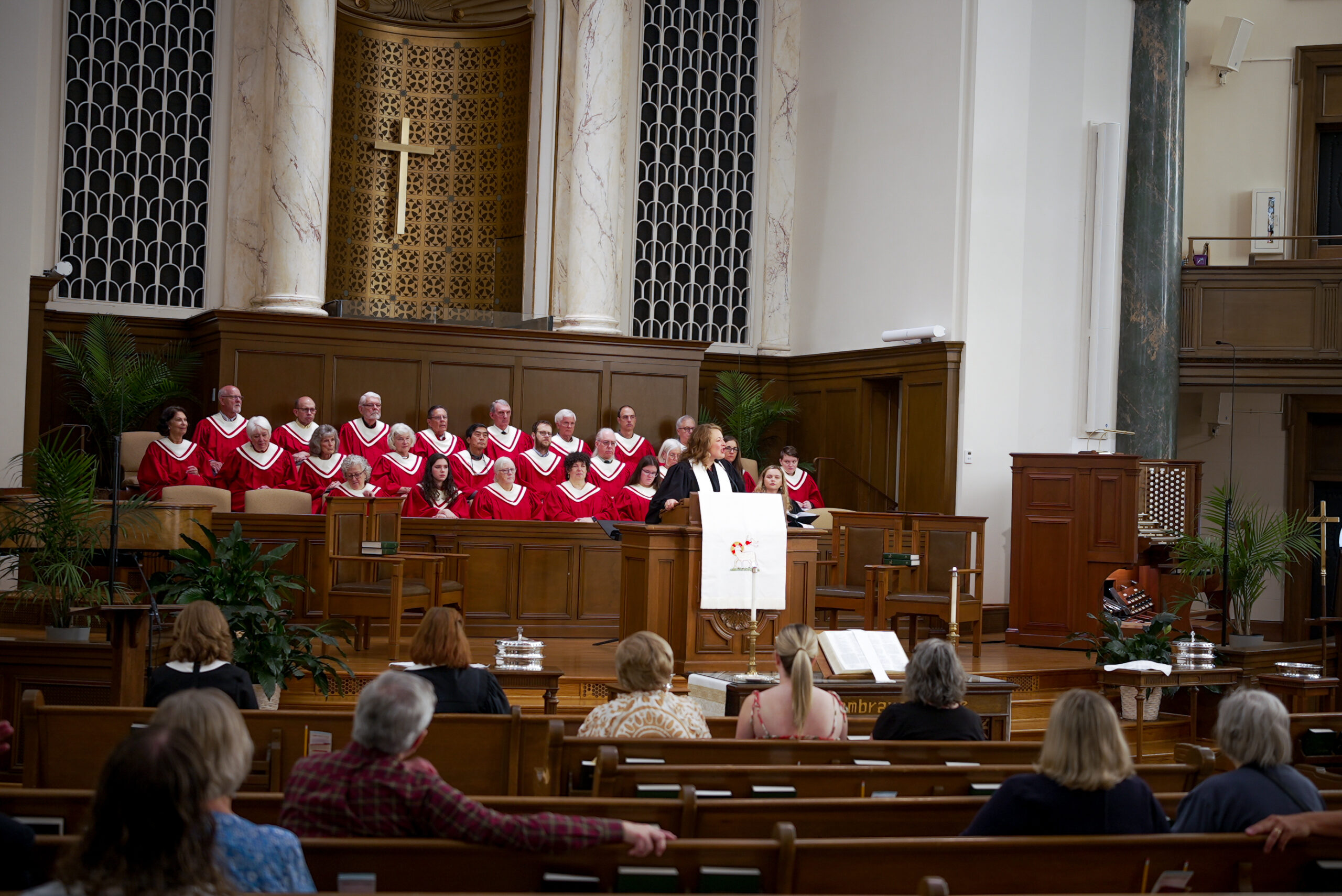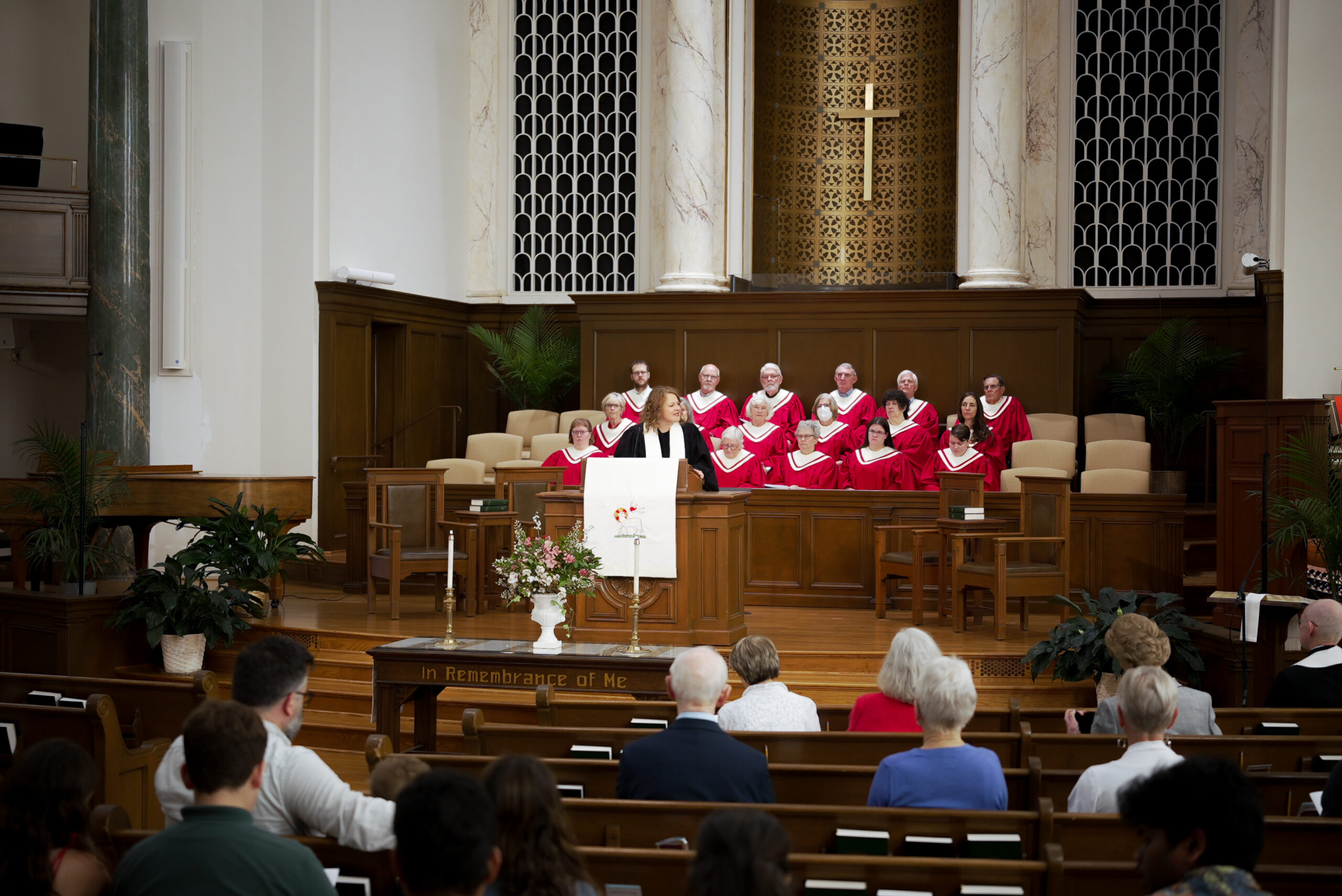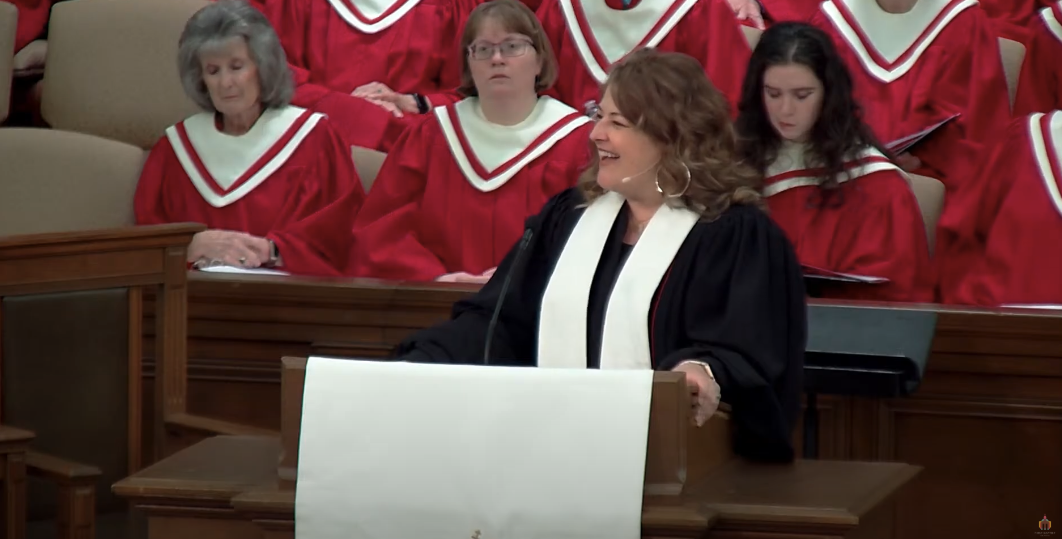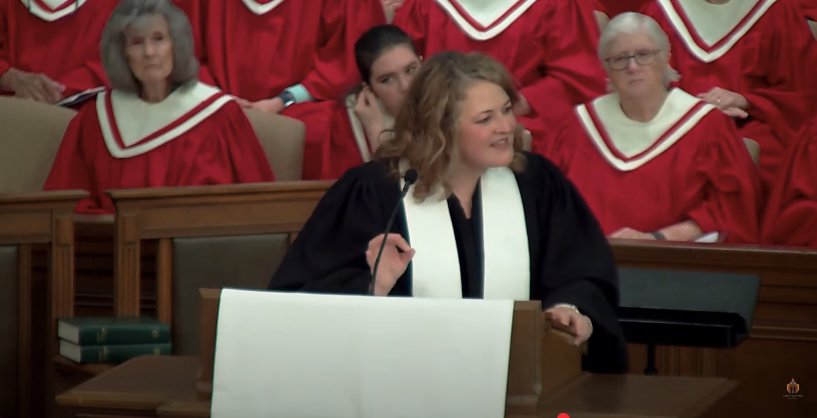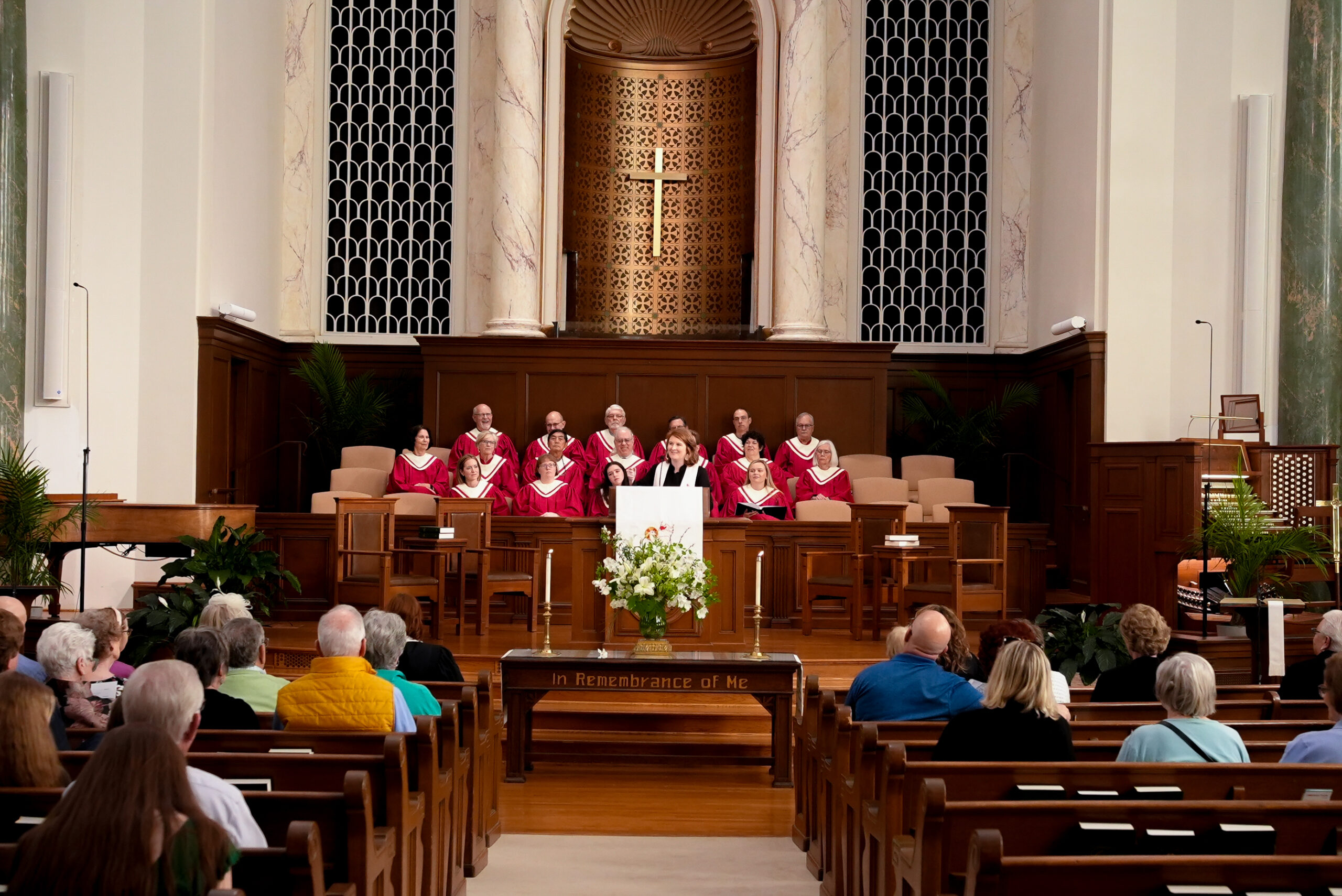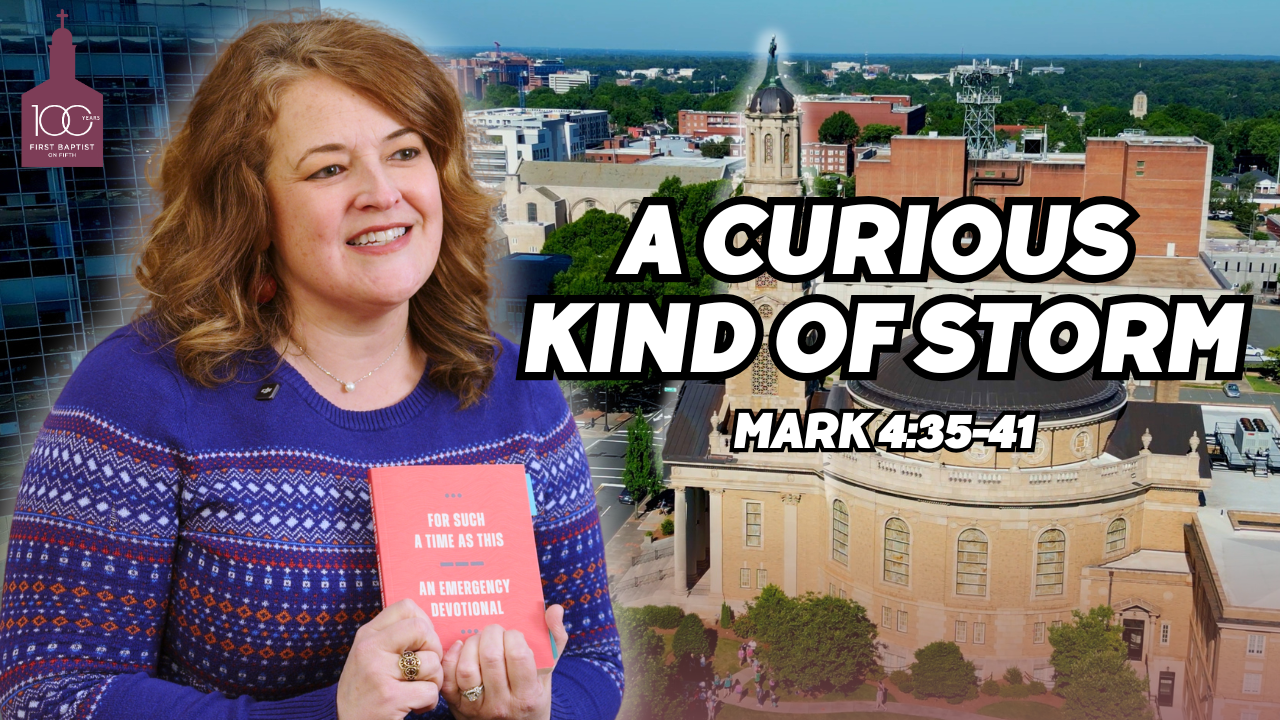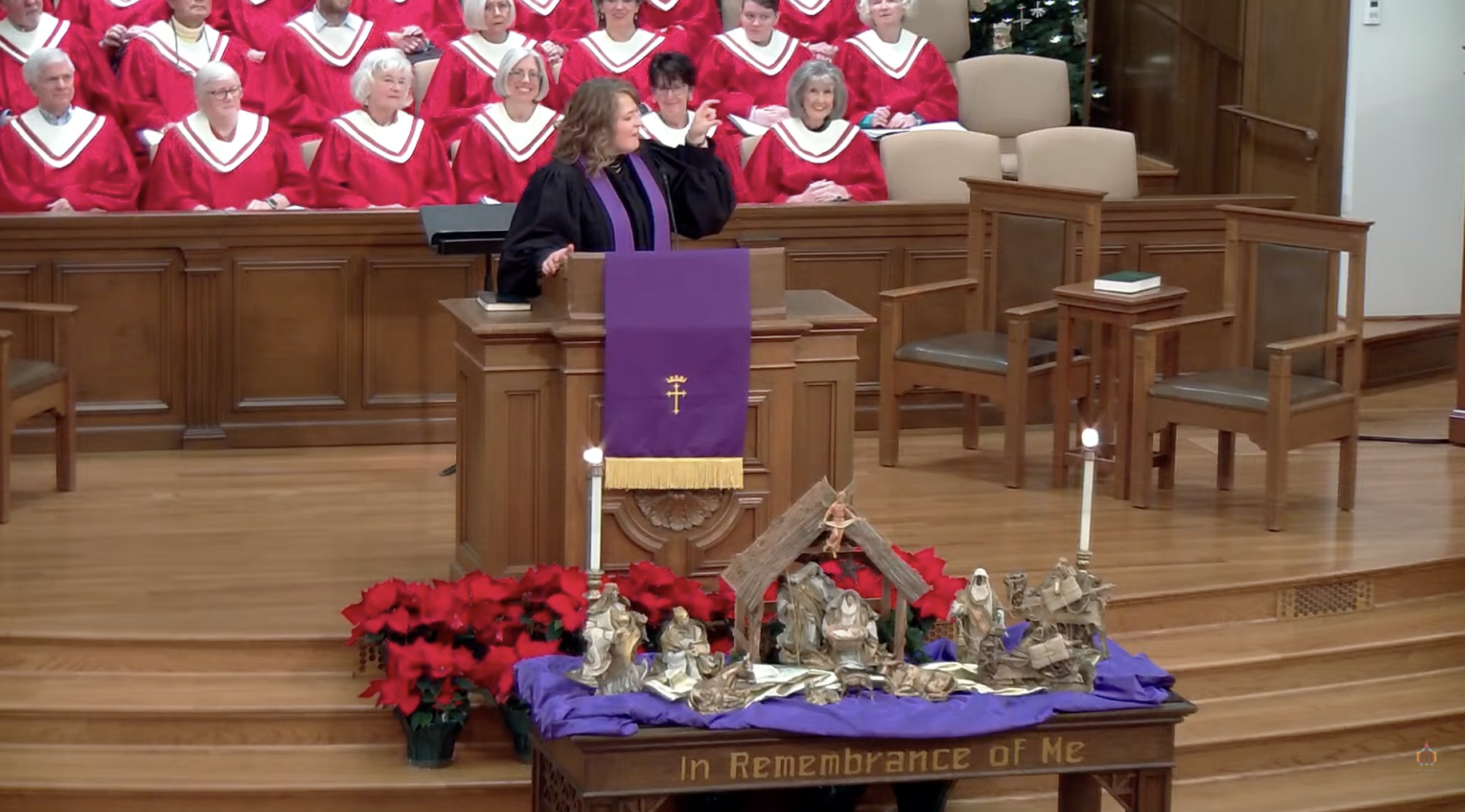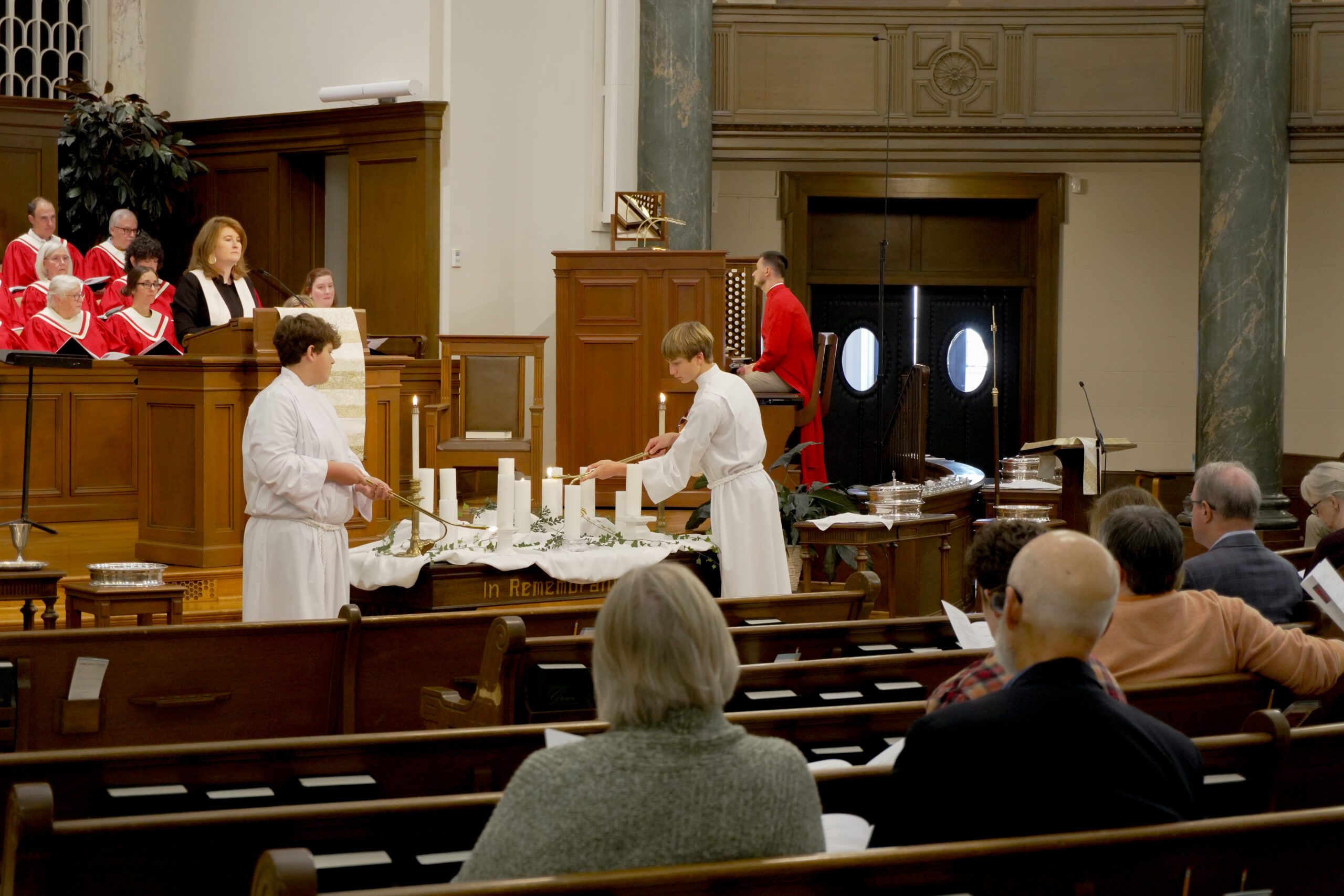I.If you were hearing the gospel reading for today and wondering to yourself, “didn’t we just hear this text about a month ago on Maundy Thursday?,” well, you’d be right. It might feel a little strange in this season of Eastertide and knowing resurrection to return to those last moments of Jesus with his disciples. Their feet weren’t yet dry from his washing. Judas had just slipped out. Surely the night felt ominous already. Surely Jesus would condemn Judas or announce that he no longer belonged to the Way of Life. Yet so total is God’s willingness and desire to reconcile, Jesus used that moment to speak of God’s glory, of the God whose presence never leaves, the God who is as visible now as anytime. “Now,” Jesus says – not later at his crucifixion or resurrection, but “now the Son of Man has been glorified, and God glorified in him.”
“Little children,” he continues, tenderly, “I am with you only a little longer…. Where I’m going you cannot come.” I wonder – could they have possibly known the reach of what this meant? Would they replay this night again and again in their minds from this moment on?
“I give you a new commandment,” Jesus continued, “that you love one another just as I have loved you, you also should love one another.” Right then, I imagine some in that room had a flashback to that day the lawyer questioned Jesus about love. Do you remember it too? “What must I do to inherit eternal life?,” he had asked Jesus, giving voice to a yearning we all wonder about. And as Jesus was wont to do, he returned the question with another question, “what is written in the law?” Without skipping a beat, the lawyer replied, “you shall love the Lord your God with all your heart, and with all your soul, and with all your mind; and love your neighbor as yourself.” He was exactly right. These were as familiar, beloved words of scripture to the Jewish faithful as any. “You’ve given the right answer,” Jesus has said back to the lawyer. “Do this, and you will live.” Perhaps he had gotten hung up on the command to “do this,” because the lawyer then needed specifics. (Lawyers tend to do that from time to time.) “Who is my neighbor?,” he had asked, curious to define the terms of that love because surely Jesus wasn’t suggesting the kind of love that has no limits, right?
There in that upper room, with their friend Judas now gone and Jesus now speaking of the end, I imagine the disciples remembered where the story went next. They remembered how he told the parable of the good Samaritan, how the religious leaders were the ones who missed the point of neighboring love entirely, what a lesson this was of Jesus to one who asked a good question. I imagine they remembered the lawyer sympathetically, because frankly, they’d wondered the same! Surely Jesus wasn’t suggesting that they spend all their time and energy and resources on loving everyone?
That day, Jesus had told a story of action, one where love was not to be contemplated, or discussed, or considered, or felt. Rather, love was to be done. Acted out. Effectuated. Labored. “Do this,” Jesus had said, “and you will live.” That is what brings us life with no end, the “doing” of the love.1
Those memories were fresh, as their eyes locked again with Jesus. “I’m giving you a new commandment now,” he had said, “that you love one another just as I have loved you.” Sometimes the disciples then were a bit dense – much like his disciples now, to be honest. But I have to imagine that this change clicked on a lightbulb in their minds. For you see, Jesus wasn’t just saying to “love God and love neighbor as you love yourself.” He was saying, “love as I have loved you!” And not just saying it, or suggesting it, or hinting at it, or proposing it if they got bored and needed something to do! No! He commanded them. It was a mandate. An order. Love that washes feet, and heals the sick, and feeds the hungry, and visits the imprisoned, and proclaims good news for the poor, and releases the captives. Love that welcomes the sinners, and shares the feast, and teaches the curious, and accompanies along the Way, and turns over the tables, and prays for God’s will to be done. Love that walks to the cross willingly for the sake of the world. Love that lays down his life for his friends. Love that does. This commandment to love like Jesus will be the last he’ll give them. And this love like Jesus is how they will be known in the world from here on.
II.This is one of those texts that, at least to me, is harder to preach than others. Give me adultery or anger or the providence of God instead, because what else is there to say about “love one another just as I have loved you.” It’s all right there! A sermon in a sentence! (And you might be thinking that a one-sentence sermon sounds pretty nice right about now!)
But if I’m being honest… is there anything harder than doing the Jesus-shaped loving in this world?
Oh we think about it, alright. There’s not a person in this room – and I bet not a person worshiping online – who doesn’t think about loving like Jesus did. We think about the type of love that knows no boundaries, and the particular communities who need to hear that message, and oh wait, have I bought my new “Y’all are Beloved” church t-shirt. We think about the devastating effects of climate change, all the policies that are incomplete and fall short, that we need to order that new compost pail and turn up the thermostat and get my bike fixed so I can ride to work this summer. We ponder injustice, and reflect on homelessness, and consider common-sense gun legislation, and debate how we legislate abundance so that all our lives are lived with meaning and resources and hope.
We think about loving a lot, and we feel it too. I heard a quote this week that watching the news on our phones now is like watching someone drown while you’re stuck on the other side of the glass and unable to do anything about it. We watch the news and feel for the people of Ukraine, for the starving children of Gaza, for the Israeli hostages still held. We scroll through Twitter and Threads and feel for those whose jobs are downsized, those who are lost in the shadows of depression, those whose lives cancer has stolen, those who are taken from their homes. In our memory, especially this weekend, we feel for our fellow citizens killed in wars, and for anyone, anywhere who suffers the violence of war. And on and on the list goes, until we realize dozens of minutes have passed, and here we still sit, but now we’re numb in our despair. Now we’re feeling despondent and disempowered and unsure if there’s anything, anything at all we can even do.
Thinking about love and feeling love are beautiful expressions of our care and concern, but they are of course incomplete. Love must be done. How will we know of Jesus’s promise of new life? By the love. By the active, spirited, getting our hands dirty kind of love. Bishop Michael Curry says, “the way of love will show us the right thing to do, every single time… It’s how we stay decent in indecent times. Loving is not always easy, but like with muscles, we get stronger both with repetition and as the burden gets heavier.”2
III.Father Michael Renninger of St. Mary’s Church in Richmond tells a story of his grandparents, who lived for years in a row house in Philadelphia. His grandfather would sit in his enormous reclining chair in front of the huge Zenith television that was as wide as it was deep, you remember those. He hollered all manner of expletives at his beloved Phillies as they disappointed him once again. And his grandmother – Nanny Woods – was an active, bustling woman, always on the go through that swinging front porch door – here and there, to and fro between card games and bingo and local church meetings.
All of this changed abruptly and unforgivingly back in 1982. That’s when Renninger’s grandfather had a series of strokes that left him paralyzed on the left side of his body. He could no longer walk or speak or swallow. His doctors finally inserted a feeding tube and they encouraged the couple to find a nursing facility where he could be cared for. But Nanny Woods was having none of that, and announced she would be taking her husband home to the row house to care for him there. And that’s what she did.
The comfortable recliner went out of the living room and was replaced by a hospital bed. Television was still there. While grandfather could no longer yell, still he could gesture to the Phillies with his right hand.
Grandmother, meanwhile, had to learn a whole new set of skills and pattern of life. Less comings and goings, more stillness. She was almost always there, right by his side, becoming the caregiver for her husband, sitting near him, learning how to feed him through a tube.
This little row house wasn’t far from where Renninger was going to college. So one Friday afternoon, as he was driving home to see his parents, he decided to stop to see his grandparents. He parked his car on the street, walked across the front porch, and pulled the squeaky screen door. As he did, he immediately had that experience – you’ve had it before – where you enter a room and sense something is wrong, but you can’t yet put your finger on it.
Until his eyes adjusted and he saw – his grandfather was in the bed: his face red, gesturing with his right hand, grandmother standing over him and hurriedly trying to move things around. Something had gone wrong with the feeding tube, and the liquid was everywhere. He was flustered. She was crying.
Now Renninger had the instinct that I know I would have had at age 19 in a moment like that – you know the one, that screams inside of you, “let me get out of this room…” He put his hand on the door, started to push it open, and with the squeak his grandmother looked up, noticing him for the first time. She was a gentle woman, one who had never raised her voice to her grandson before. But in that moment she shouted, “Don’t you dare!” He stopped. “Don’t you dare leave,” she said to her grandson of 19, “because sometimes love looks like this.”3
IV.“Love one another just as I have loved you,” Jesus says. Sometimes love looks like this. That’s not to say there’s no place for the thinking and feeling deeply about one’s love. Nor is this sermon to suggest that any of us are not doing enough. God is not watching you with a checklist, quick to point out where you’ve failed or fallen short in all you do. God is love, let me remind you. But it is to say that we don’t stop with the thinking and feeling, that we don’t confuse our thinking and feeling for doing. That’s the kind of love we’re called to do, and that love looks like Jesus, and acts like Jesus, and communicates Jesus to the world.
That love can be shared. It’s not a burden that only each of us carries, no question. Similar to doubt and belief, sometimes if I’m struggling to love, you love for me, and vice versa among the abundant gifts of the church that we do together. But sometimes, love is a solitary practice, like Father Rennegar’s Nanny Woods. Like your parenting, or your caregiving, or your supervising, or your volunteering, or your advocating, or your resisting, or your relinquishing. Love may not be as visible or lauded. Doesn’t easily turn into a resharable post online. Won’t always be appreciated. It’s a “taking up my cross” kind of love that we may worry will crucify us to the death. But when we love like Jesus, that’s the kind of love that will bring us life, again and again and again.
“Little children, I am with you just a bit longer,” Jesus says. So go and love like I loved you. Do that kind of love in Jesus name. And we all will be changed!
V.I’ve shared with you before about Father Greg Boyle, founder of Homeboy Industries in LA, the largest gang-intervention, rehabilitation, and reentry program in the world. He’s a hero of mine, and I bet for some of you too.
“At Homeboy Industries we are a sangha, which is to say, a community of practitioners,” Father Greg writes. “A homie told me that he ‘was Homeboy Industries raised,’ and so, he now ‘practices’ the culture of it in how he sees and operates. We are all called to be practitioners. Otherwise…we’re audience.”
“At the Chautauqua Institution,” Father Greg starts, telling about that famed New England summer community of learning and curiosity, “four homeboys and four homegirls were leading a brown-bag discussion at lunchtime. I snuck into the back of the very packed room, and no one I knew was there. During the Q & A, an ancient woman stood, grabbing the back of the chair in front of her for support, and said with an emphatic and overly loud voice, “FATHER GREG IS GOING TO DIE.” (I startled immediately, thinking she was privy to some information I didn’t have.) “SO WHAT ARE YOU GOING TO DO WHEN HE’S GONE?” The panelists knew it was a question about a succession plan. José stood and gestured to the other panelists and said simply, “All of us… have keys to the place.” The cramped room was filled with deafening applause. Frail-boned kindness. Practitioners, all.”4
“Little children, I am with you only a little longer,” Jesus says to us, then and now. So love. Act love. Practice love. Do love. Love like I have loved, so that all the world will know and someday respond, “all of us have keys to the place!”
Amen!


